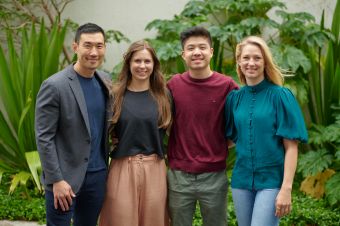
Startmate's Summer ‘22 cohort of 16 companies. Image: supplied.
It’s not enough to want to solve an urgent problem, Startmate says. Successful founders need tenacity, self-awareness and a customer-focused mindset in equal measure.
Australia and New Zealand-based startup accelerator Startmate debuted its fresh batch of hungry founders at demo day events held across Sydney, Melbourne and Brisbane.
Amid a boom in local VC capital — recent analysis revealed a record $866 million in funding flowed through the startup ecosystem in the first three months of 2022 — there’s never been more opportunity for startup growth.
But Startmate’s entrepreneur in residence Megan Woff says success is still contingent on the magic ingredients that make a great founder.
No matter how good you are at selling your vision to customers, a founder “needs to have a deep connection with the problem they want to solve”, Woff tells SmartCompany.
Woff, who guided the summer 2022 cohort of 16 companies through the competitive Startmate accelerator program, is in an ideal position to boost founders in their journey, having been through the program herself with a previous startup.

Startmate accelerator team Paul Redfern, Megan Woff, Euwyn Goh and Lauren Capelin.
The cohort is the first to receive investment under Startmate’s revamped standard terms.
Each of the startups entering the accelerator now receive a $120,000 investment at a $1.5 million post-money valuation. For companies that have previously raised, Startmate invests $120,000 while matching the last valuation and terms.
SmartCompany asked Woff to share her top three picks from an “really exciting” cohort of future-looking innovators.
1. Critical.
‘From plastic waste to beautiful, durable, endlessly recycleable building materials.’
The world produces over 300 million tonnes of plastic waste each year and only 9% is recycled.
New Zealand-based Critical. wants to help corporates take responsibility for the 83% of all plastics sent to landfill each year that is created by big business.
The startup’s technology platform uses proprietary tech to transform 24 types of plastic waste into its first product, a range of durable 100% recycled plastic panels for building fit outs.
The company is targeting corporate polluters like McDonalds and KFC to invest in its technology. It says this will create a sustainable use for plastics as well as disrupt the $938 billion global timber and fibre board market.
Critical. is among the companies that “make something people want and solve problems in a way that [is] extremely country customer centric”, Woff says.
It is combining real-world solutions with the X-factor that inspires consumers.
“Here’s something that really exciting and you want to use. And by the way, it happens to be solving a really big problem that you have,” she explains.
2. Lockpick Games
‘Turning the joy of video games into high test scores and greater opportunities.’
The brainchild of founder Tash Jamieson, the mission of Lockpick Games is to encourage kids to study for standardized tests by putting the test prep inside games.
The platform creates adventure video games that have standardised tests built into the gameplay, helping make study more pleasurable and motivating for young people.
Jamieson claims the startup has global scaleability as standardised tests continue to factor as a core part of academic programs.
Jamieson has “a really deep understanding of a problem”, Woff says, of her entry in the accelerator program. “And she’s approached it in a very kind of different way, [with] really exciting, big vision.”
3. MyGigsters
‘Financially securing gig work.’
As more Australians enter the gig economy, concerns about the rights and protections, along with the long-term wellbeing of these workers, is gaining greater prominence in the national conversation.
Traditional financial services are only designed to meet the needs of employees and are not fit-for-purpose for gig workers across the globe, MyGigsters argues.
80% of workers in the gig sector are cut off from income protection and unprepared for unexpected financial trouble.
MyGigsters, a global financial services platform for gig workers, plans to empower gig workers with insights to help them access financial products and gain greater security.
Founder Benjemen Elengovan worked in food delivery and across other platforms when he arrived in Australia as a student.
Elengovan is “super mission-driven”, Woff says.
What’s more, Elengovan is also continuing to work in the gig economy as he builds the company, giving him immediate and real-world insight into the evolving concerns of workers.
“He’s living and breathing the problems himself, which is really cool,” Woff says of the reason the accelerator program backed the startup.
Handpicked for you

Linktree founders back creative startups with new venture fund



COMMENTS
SmartCompany is committed to hosting lively discussions. Help us keep the conversation useful, interesting and welcoming. We aim to publish comments quickly in the interest of promoting robust conversation, but we’re a small team and we deploy filters to protect against legal risk. Occasionally your comment may be held up while it is being reviewed, but we’re working as fast as we can to keep the conversation rolling.
The SmartCompany comment section is members-only content. Please subscribe to leave a comment.
The SmartCompany comment section is members-only content. Please login to leave a comment.